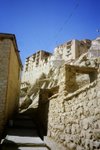While revelers in New York were welcoming the New Year in Times Square, Muslims in Ladakh, especially in the Kargil area, were celebrating with religious fervor and solemnity the annual festival of Eid-ul-Azha. This festival, observed on the tenth day of the last month of the Islamic calendar, coincides with the last day of the annual pilgrimage to Mecca, the Hajj, and this year with January 1 of the Western Christian calendar.
Eid-ul-Azha commemorates the willingness of Abraham to sacrifice his son on an altar to Allah. According to news reports, thousands of Muslims offered prayers in their mosques, after which they sacrificed cows, goats, sheep and camels at their homes. The meat was then consumed and shared with family, friends, and the poor. Children, dressed up for the occasion, visited relatives and exchanged gifts with their elders. In other years, religious and political leaders have often prayed publicly for peace during the solemn festival, saying the kinds of things leaders say on such occasions.
The Buddhists of Ladakh also marked the New Year, though they began to observe Losar (Lo meaning “year,” sar meaning “new”) last Thursday, December 28th. People in the primarily Buddhist district of Leh celebrated the beginning of the new year by swinging large fireballs, known as metho. Men whirled torches around in a fantastic procession through the streets until they finally tossed them away, well outside the town—their way of throwing out the old year and welcoming in the new. The Losar celebrations will last until the end of January.
Ladakhi Buddhists went to the major monastery in Leh to pay their obeisance to Maitreya Buddha and, according to Tshering Norbu Martey, a Buddhist scholar, to “pray for world peace.” They believe their rituals will assist the ancestors and help expel the evil, negative forces that exist in their villages. Observing Losar, they hope, will rid them from the miseries and sufferings of the old year and bring prosperity and happiness in the new. They celebrate the holiday by drinking, singing, dancing, and making merry, as well as by twirling their torches.
Meanwhile, factional political leaders in Ladakh welcomed the new year in their usual fashion. A newspaper report from Kargil indicated that the Ladakh Buddhist Association and an institution called the Islamia School in Kargil had reached an agreement to suspend many of the demands of their respective constituencies, such as Union Territory status, autonomy, special language requirements, and the like. Supposedly the two groups had even talked about requesting division status for Ladakh.
The District Congress Committee reacted with considerable alarm, condemning the unilateral action of the LBA, which it said had ignored the “confidence and consent of the people of Ladakh.” It called the LBA decision “extremely unscrupulous and vacuous.” The DCC also lashed out at another Buddhist group, the Ladakh Union Territory Front.
The LBA repeatedly denied that it had reached any such agreement with the Islamia School, and it criticized the DCC for its verbal attacks. The LBA alleged that the Congress party had provoked the situation on purpose on the eve of the Losar celebrations. According to the LBA press release, "even during the Losar celebrations, some miscreants tried to disrupt the function[s] … near the mosque so that a wrong message [would] go between the two communities.” The LBA also charged that the DCC statements were “an attempt to create misunderstanding between the Buddhists youths."
So while the people of the Muslim and Buddhist communities in Ladakh celebrate their festivals, political leaders make vacuous statements about peace and hurl charges and counter charges. Their attempts to stir up trouble may increase their popularity, at least temporarily, and they may help cement the pettiness of power in the new year.
(peacefulsocieties.org 4th january 2007)

A glimpse of ladakhi daily life...
Discover Ladakhi Reggae...'Nazron ke Samne' (Yang Su Saam)
Subscribe to:
Post Comments (Atom)





No comments:
Post a Comment